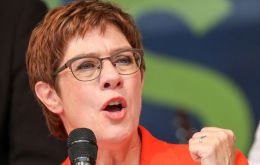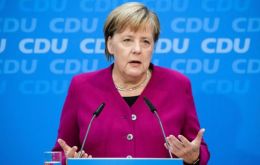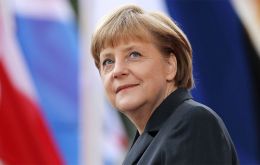MercoPress. South Atlantic News Agency
Tag: Social Democrats (SPD) Germany
-
Tuesday, October 29th 2019 - 19:02 UTC
Germany's Christian Democrats hounded by far left and far right voters

German conservative leader Annegret Kramp-Karrenbauer on Monday (Oct 28) faced a rebellion by party members angry at a humiliating election result in eastern Thuringia state where the Christian Democrats (CDU) lost voters to both the far-left and far-right.
-
Monday, September 2nd 2019 - 09:40 UTC
Extreme right advances in German regional elections deepens ruling coalition division

Chancellor Angela Merkel's conservatives and her Social Democrat (SPD) coalition partners bled support to the far right in two state elections in eastern Germany on Sunday, dealing a double blow to her already unstable ruling alliance.
-
Tuesday, October 30th 2018 - 08:03 UTC
End of an era: powerful Angela Merkel announces her exit from the world stage

Marking the end of an era, German Chancellor Angela Merkel's announced on Monday her last term in office. The dominant figure in German and European politics for more than a decade said she will step down as party leader of her Christian Democratic Union, CDU, in December and not seek reelection as chancellor in 2021.
-
Monday, October 15th 2018 - 07:17 UTC
Bavaria's CSU loses its majority in regional election; blow for Merkel's coalition

Angela Merkel's sister party has suffered massive losses in Bavaria's state elections, exit polls suggest, in a blow to the German chancellor. The CSU is set to lose its absolute majority in the state parliament, while the Greens surged into second place and the anti-immigration AfD entered the state parliament for the first time.
-
Saturday, January 13th 2018 - 09:17 UTC
EU sigh of relief: Germany's grand coalition en route to a “renewed marriage”

Chancellor Angela Merkel struck a deal with Social Democrat (SPD) rivals on Friday to open government coalition talks, easing months of uncertainty that has undermined Germany’s global role and raised questions about her political future. But the deal to revive a “grand coalition” that has governed since 2013 must be approved by an SPD congress planned for January 21.
-
Monday, May 15th 2017 - 07:01 UTC
Merkel en route to a fourth term: her party unseats Social Democrats in key state election

Germany's Christian Democrats (CDU) have unseated the Social Democrats in a key state election, exit polls are indicating. Chancellor Angela Merkel's CDU is projected to win 34.5% of votes in North Rhine-Westphalia, compared with 30.5% for the Social Democrats (SPD). It was seen as a test for Mrs. Merkel ahead of September's general election.
